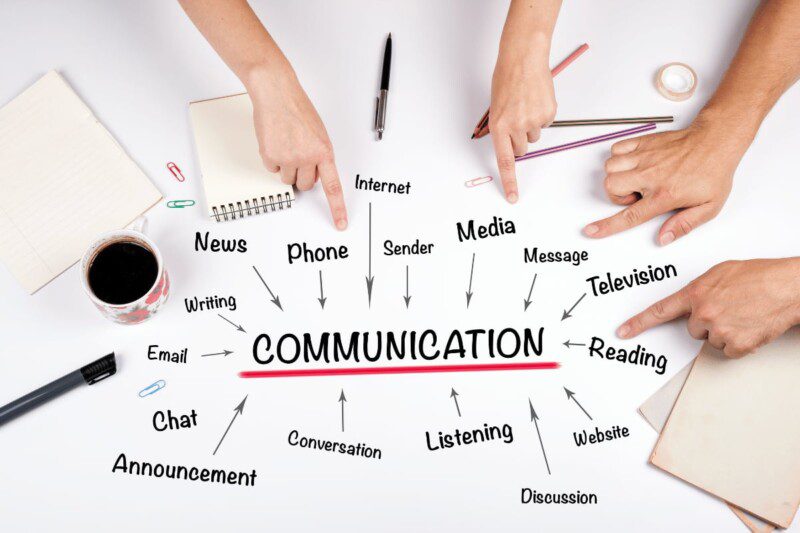Almost every organization consists of several authority levels and departments, often called the hierarchy of organizational functions. They depend on each other to function smoothly and achieve short and long-term goals. A lack of communication between organization subunits could hinder workflow and lower productivity and morale. So, as an entrepreneur or manager, you will need to improve communication continuously.
If a business owner or manager fails to relay work tasks clearly, employees are bound to make blunders due to confusion. Whether an organization follows a centralized or decentralized communication policy, effective communication is crucial to attaining organizational goals.
So, here are some tips to follow to improve communication in your business.
1. Learn Ideal Ways to Communicate with Employees
Understanding your employees’ preferred communication styles is difficult until you build a rapport with them. Listen and observe actively to the way they correspond to verbal and non-verbal cues. Are they timider when they need to speak in person? Are they having trouble conveying themselves clearly through email? It’s natural for everyone to have a different communication style that stems from their personality.
Instead of forcing employees to adapt to your communication style, try implementing theirs. Or, seek avenues to build their communication skills and expertise – this is where eLearning will prove to be your best bet. Offer your workforce learning resources such as the Online Master of Communication Management program to boost communication skills.
Such online programs prepare professionals to communicate efficiently in the workplace with all stakeholders, alongside instilling essential communication skills.
2. Schedule Frequent Team Meetings
Often a group of employees is assigned to work together on a joint project. However, they may fail to communicate effectively with each other. It can cause significant confusion and frustration, as they won’t be able to work cohesively. They could also have conflicts or misunderstandings that could hamper the workflow.
Scheduling weekly team meetings can be essential to foster a positive environment between the workers. They can discuss ideas, potential challenges, or delays and give each other pointers, creating a sense of community. Moreover, you can get an idea of how each project is progressing.
3. Provide Constructive Feedback
Several managers make the mistake of endlessly criticizing their employees and micromanaging their work. They provide useless feedback only aimed at increasing grievances rather than helping the employee improve. They also use a harsh tone that could make employees feel belittled and frustrated, fueling workplace incivility. Sometimes they openly criticize them in front of other members while in a meeting.
To improve communication, you should know how to offer constructive feedback. Constantly pointing out every minute issue isn’t the way to go about it. Speaking to the employee privately is better so they don’t feel embarrassed in front of others.
Moreover, using soft but firm tones is essential to get the point across without hurting their feelings. If an employee has committed a mistake, help them find ways to correct it and advise them on preventing it. Most importantly, don’t forget to appreciate them for even minor achievements.

4. Praise Good Work
Employees often work tirelessly to meet the company’s goals. They put in long hours and undivided attention to attain fruitful results. However, sometimes they feel like they aren’t valued or recognized for their efforts. And this can be a demotivating factor that could lower employee morale in the long run.
It would be best if you actively strived to assess employees’ performance. Those who perform well and stand out should get some praise and appreciation. If you can’t provide incentives for good work, even displaying gratitude is enough to boost their productivity and motivation. It is also advisable to be thoughtful when praising their work. Don’t just tell them they performed well. Be specific about what area they excelled in and how their work stood out.
5. Have One-On-One Meetings
Though team meetings are vital, specific workers may refrain from participating. Due to some employees’ timid nature, they may be unable to share their perspectives. Employees may also not feel any proximity to you if all you ever discuss are work-related topics. Hence, they would maintain a respectful but distant relationship.
You can amend these issues by having personal one-on-one meetings that can help you gain a deep insight into their work ethic. You can learn more about their experience in the company and whether they face any challenges. Even introverted employees will find it easier to approach you once you help them discuss their issues and priorities with you privately.
It’s also worthwhile to initiate topics outside of work. Provide a platform to your workforce where they can indulge in informal conversations and shed some workplace stress.
6. Follow Up Meetings
Although we talked about one-on-one meetings, follow-up meetings are different altogether. These meetings are essential for discussing ideas and explaining directions about how to conduct specific work tasks or what new projects are in the pipeline. However, it is relatively easy for employees to lose focus and miss out on several points. That can impact their work once the meeting ends as they won’t have complete information. It is also normal for two people to have different takeaways from the same topic, interpreting the crux almost completely differently.
Managers need to convey their points clearly and in detail during meetings. They should follow them up and convey their expectations to ensure everyone is on the same page. Providing a recap also ensures employees don’t misinterpret jargon and are reminded of important ideas and matters discussed in the initial meeting.
Conclusion
Every business owner and manager should strive to increase employee satisfaction and retention. One way to do that is by improving their channels and methods of communication.
When employees feel heard and valued, they feel their perspectives and opinions matter to the company. And this ultimately increases trust, boosts transparency, builds motivation, and improves productivity, enhancing the company’s overall performance.
So, implement these six tips to build rapport, convey vital points, and ensure employees’ efforts are rewarded. Eventually, you’ll witness a rise in your workforce’s performance and engagement levels.



